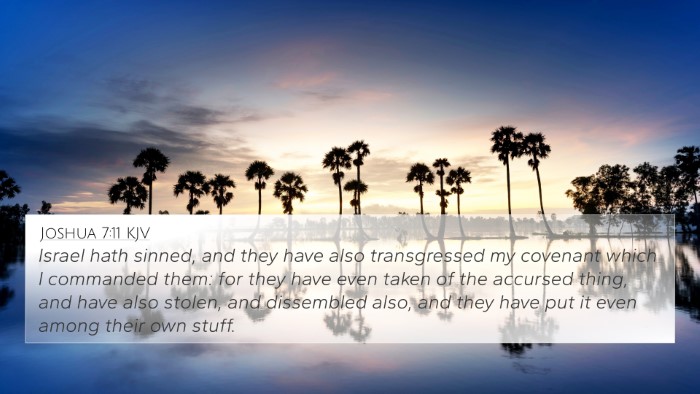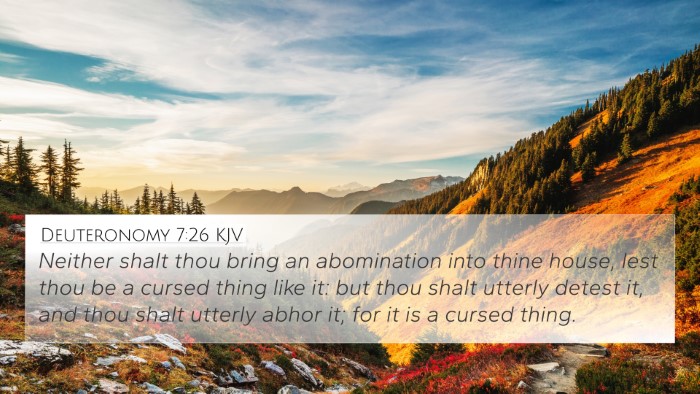Understanding Deuteronomy 2:34
Deuteronomy 2:34 (KJV): "And we took all his cities at that time, and utterly destroyed the men, and the women, and the little ones, of every city; we left none to remain."
Summary of the Verse
The verse recounts a significant moment in the narrative of the Israelites' journey to the Promised Land, where the cities of Sihon, king of the Amorites, were completely conquered and destroyed. This action can seem drastic; however, it is essential to understand the context behind this divine judgment.
Commentary Insights
-
Matthew Henry's Commentary:
Henry emphasizes the totality of destruction as a fulfillment of God's commands regarding the conquest of the Promised Land. He explains that such actions were taken to remove wickedness and corruption so that Israel could inherit the land without contamination from idolatrous practices.
-
Albert Barnes' Notes:
Barnes sheds light on the severity of divine judgment. He notes that this destruction was a direct result of the Amorites' persistent wickedness and rejection of God's ways. The annihilation of entire households served as a stark warning against disobedience to God's will.
-
Adam Clarke's Commentary:
Clarke presents a moral reflection on the episode, suggesting that while God's commands might seem harsh, they reflect a larger divine plan for justice. He highlights the importance of understanding the cultural and historical context to appreciate God's commandments better.
Key Themes
- Divine Judgment: The verse encapsulates themes of justice and divine retribution, reinforcing the understanding that God punishes nations for their iniquity.
- Obedience to God's Will: The destruction serves as a narrative on the significance of adhering to God’s instructions and the consequences of failure to do so.
- Preservation of Holiness: The act of destruction was portrayed as necessary for the spiritual purity of Israel, to avoid being influenced by the immoral practices of the conquered nations.
Cross-References for Deuteronomy 2:34
This verse is interconnected with various other Biblical texts. Here are some notable cross-references:
- Numbers 21:24-26: Describes the conflict with Sihon and the subsequent victory.
- Deuteronomy 3:6: Reiterates the command to destroy these cities completely as a part of God's instruction.
- Deuteronomy 7:1-2: Discusses the command to defeat and destroy the nations in the Promised Land.
- Joshua 12:4-5: Lists the kings which Israel defeated, emphasizing God's faithfulness in fulfilling His promises.
- Joshua 6:21: Describes the destruction of Jericho, drawing parallels to the total destruction required in this verse.
- Exodus 23:23-24: Warns against mixing with the inhabitants of the land, which can relate to the themes of purity and obedience.
- Romans 2:6-8: Discusses God's judgment on humanity, providing a New Testament perspective on divine justice.
Connections Between Bible Verses
Deuteronomy 2:34 showcases the connections between various scriptural texts that reflect similar themes of judgment and obedience:
- 1 Samuel 15:3: God's command to utterly destroy the Amalekites serves as a parallel in demonstrating the need for total obedience.
- Revelation 19:11-21: Alludes to the final judgment, echoing the concept of divine retribution and victory over evil.
- Psalm 37:28: Talks about the fate of the wicked and the preservation of the righteous, tying into the overarching theme of divine justice seen in the Old Testament.
Thematic Commentary
By analyzing these verses together, we develop a deeper understanding of the importance of spiritual purity within the community of faith and the serious nature of rejecting God's commandments.
Using Cross-References in Bible Study
Cross-referencing is an invaluable tool for enriching one’s understanding of the scripture:
- Tools for Bible Cross-Referencing: Utilizing a Bible concordance can aid in finding connections between verses.
- Bible Cross-Reference Guide: It helps believers see the linkages in God's word that are often not immediately visible.
- Identifying Connections: Understanding the links between Old and New Testament writings enriches our faith journey.
Conclusion
The study of Deuteronomy 2:34 leads us to acknowledge the seriousness of God's instructions and the implications of disobedience. Through a collective examination of cross-references and thematic studies, believers can gain deeper insights into God’s nature, justice, and the necessity for obedience. Through careful study and cross-referencing, we can appreciate how inter-Biblical dialogue enhances our understanding of both the Old and New Testaments.














